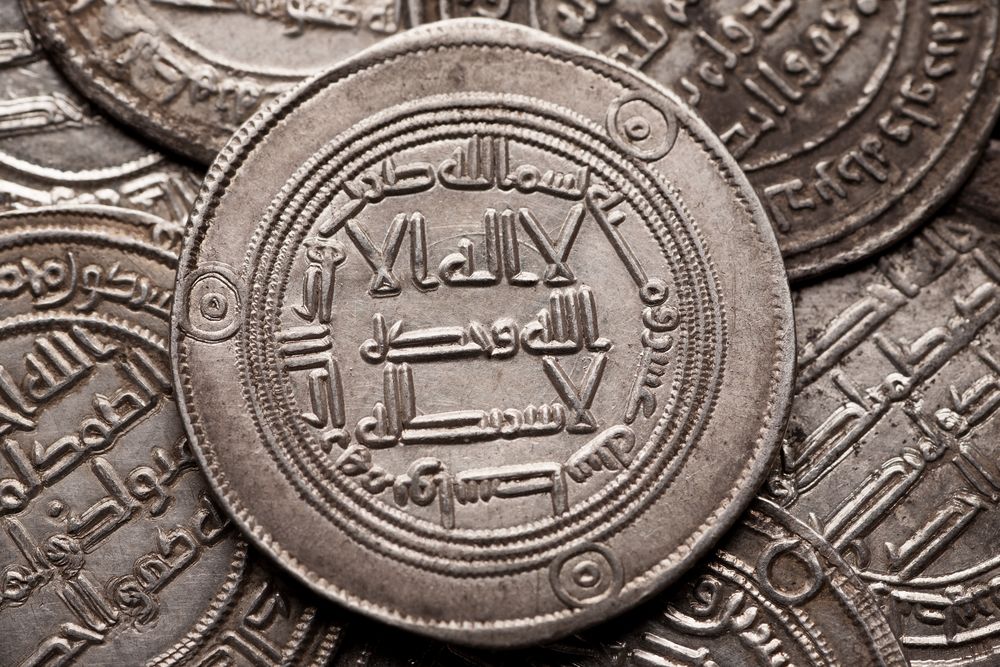
Among the stories and narrations repeated and chanted by the Islamists are tales about the asceticism of those they term the Companions: how one of them used to wear patchwork clothing made of thirty pieces (‘forty’ according to some others), while others work patches even if they were showing gaps. We shall here open up this file and see what the books of those who term themselves Ahl al-Sunna wal-Jamā‘a[1] say about the asceticism of those Companions when it came to wealth and possessions.
IF WE TAKE the first example, the man wearing patchwork, this refers to ‘Umar ibn al-Khaṭṭāb. The Ahl al-Sunna wal-Jamā‘a literature narrates how he actually owned maidservants and female slaves as his personal property, bringing them out for his guests ‘with their breasts heaving’. Let us see what Anas ibn Mālik has to say, as reported by al-Bayhaqī in his Sunan:
Anas ibn Mālik said: “‘Umar’s slave-girls used to serve us, with their hair showing and their breasts heaving.”.[2]
According to Yaḥyā ibn Salām in his Tafsīr (1/441):
Anas ibn Mālik said: ‘’Umar’s maidservants used to serve us with nothing covering their heads and with their breast heaving with their khidām showing”.
According to al-Sarkhasi in his work Al-Mabsūṭ (9/12):
Anas ibn Mālik related a hadith that ’Umar’s maidservants used to serve the two of us guest with nothing covering their heads and with their breast heaving.
Al-Albānī relates the hadith in his work Irwā’ al-Ghalīl (6/204):
“Umar’s slave-girls used to serve us, with their hair showing and their breasts heaving.” – In my view this has a sound sanad (train of transmission), all of the transmitters of the hadith being trustworthy.
We also find that Ibn Ḥabbān stating:
As for Abū ‘Abdullāh ibn Na‘īm ibn ‘Abdullāh Al-Mujammir, the mawlā of ‘Umar ibn al-Khaṭṭāb his father’s name was Muḥammad, or as others said, ‘Al-Mujammir’, because he used to carry the incense-burner (mijmara) before ‘Umar ibn al-Khaṭṭāb whenever he went out to pray in the month of Ramadan.
So the man who wore a cloak with thirty patches owned maidservants and girl-slaves, had a servant who walked in front of him bearing an incense burner. And what did he leave to his family after he died? This question is answered by ‘Abdullāh ibn ‘Abd al-Raḥmān al-Dārimī in his hadith collection known as Sunan al-Dārimī:
“‘Umar ibn al-Khaṭṭāb bequeathed to the mothers of his children four thousand for each of them”.[3]
If we go back to the work Al-Ṭabaqāt al-Kubrā (the Ṭabaqāt Ibn Sa‘d) we see the author mentioning huge numbers when discussing the wealth amassed by those termed the Companions. We should note here that the names we will mentioned were – up until year 10 of the hijra – none of them able to earn their daily bread. However, all of a sudden as Ibn Sa‘d mentions:
The day that ‘Uthmān ibn ‘Affān died had in his treasure thirty thousand thousand (i.e. thirty million) dirhams, plus six hundred and fifty thousand dinars [the dirham was the currency of Persia and the dinar the currency of the Byzantines]. This was duly plundered and dissipated, and a thousand camels were left behind in Rabadha, along with alms collected from Bir Adis, Khaybar and Wādī Al-Qurā worth two hundred thousand dinars.[4]
The value of what Zubayr left was fifty-one or fifty-two thousand thousand dirhams. Zubayr owned land in Alexandria (Egypt), in Kufa, land and property in Basra, along with proceeds from produce from the city’s nobles.[5] ‘Ā’isha bin Sa‘d ibn Abī Waqqās narrates: “My father (may Allah have mercy on him) died in his palace in al-‘Atīq, ten miles from Madina, and the day he died he left two hundred and fifty thousand dirhams.[6]
According to the report of Muḥammad ibn Ibrāhīm, Ṭalḥa ibn ‘Ubayd Allāh used to receive in Iraq the proceeds of produce to the value of between four hundred thousand to five hundred thousand dirhams, and from Sarāt proceeds amounting to ten thousand dinars more or less. Isḥāq ibn Yaḥyā relates from Mūsā ibn Ṭalḥa that Mu‘āwiya asked him: “How much did Abū Muḥammad (may Allah have mercy on him) leave from Al-‘Ayn?” – “He left one million and two hundred thousand dirhams, and two hundred thousand dinars. He was receiving annually from Iraq proceeds amounting to a hundred thousand, aside from his proceeds from Sarāt and elsewhere. He used to supply his family annually in Madina with food from an irrigated farm (the value of what Ṭalḥa ibn ‘Ubayd Allāh left of real estate and cash was thirty thousand dirhams. From al-‘Ayn he bequeathed two million two hundred thousand (the rest being made up of pledges). [7] Ibn al-Jawzī said that ‘Ṭalḥa bequeathed three hundred gold camels’.
There is also ‘Abd al-Raḥmān ibn ‘Awf, who left behind a thousand camels and three thousand sheep and a hundred grazing mares in al-Baqī‘. At al-Jarf he had twenty irrigated cultivations and in his bequest there was lumps of gold which was cut up with axes but too heavy for men to carry, and he left behind four women, each valued at eighty thousand. [8]
Al-Mas‘ūdī in his work Murūj al-Dhahab (1/544) narrates that when Zayd ibn Thābit died he left behind gold and silver that was cut up with axes, along with coins and country estates. Ya‘lī ibn Umayya died leaving behind five hundred thousand dinars and country estates and debts due from people and real estate amounting to three hundred thousand dinars.
As for fighting over how to plunder the savings of Muslims Al-Balādhur narrates in his work Ansāb al-Ashrāf, (Part Three, p.952):
‘Abdullah ibn al-Zubayr came on a windy night when it was dark and very cold accompanied by a group of soldiers, who assaulted ‘Uthmān ibn Ḥanīf in the residence of the prince. They seized him and took him to the Bayt al-Māl (treasury) where they found people from Al-Zat guarding it. They slew forty of them, and news of what they did in seizing ‘Uthmān and plundering what was in the Bayt al-Māl was sent to ‘Ā’isha to consult her as to what to do to ‘Uthmān. ‘Ā’isha replied: “Kill ‘Uthmān ibn Ḥanīf”.
Their greed induced them to rob the Bayt al-Māl, even if this meant killing the unfortunate guards
We also observe what ‘Abdullah ibn ‘Abbās – dubbed ‘the Nation’s Ink’ for his writings as the narrator of hadiths and the authority for the interpretation of the Qur’ān, one who was made governorof Basra by ‘Alī ibn Abī Ṭālib, did. Abū al-Aswad al-Du’alī, the minister of finance in Basra, wrote to the ‘Alī ibn Abī Ṭālib saying: “Your agent, and your cousin (‘Abdullah ibn ‘Abbās al-Hāshimī) has been embezzling what is under his control without your knowledge.”
The Caliph sent to his cousin and governor asking about what he had heard. After receiving this ‘Abdullah ibn ‘Abbās responded with a letter of resignation to the Caliph saying: “By God, all that God has cast into the earth and all that it yields is too dear to me for me to wave it aside, for I have shed the blood of the nation in order to achieve power and this emirate! So send to me your agent what you will.” Ibn Abbas was thus not ashamed to steal from the Bayt al-Māl of the Muslims, but justified it by saying that if he had consumed everything the earth contained, that was less that than what the Caliph and Commander of the Faithful ‘Alī ibn Abī Ṭālib was doing.

Suggested Reading
As for sharing out gifts to buy loyalty, Al-Ḥāfiẓ al-Mazī mentions in his biographical work Tahdhīb al-Kamāl fī Asmā’ al-Rijāl:
Muḥammad ibn Sa‘d said, quoting Muḥammad ibn ‘Umar al-Wāqidī: “Yazīd ibn Firās narrated to us, from Sinān ibn Abī Sinān al-Daylī, from his father, who said: ‘I saw how Suhayl ibn ‘Amr, al-Ḥārith ibn Hishām, and ‘Ikrima ibn Abī Jahl came to ‘Umar ibn al-Khaṭṭāb who gifted five thousand horses to each of them. [9]
In his work The History of Madina Al-Ḥasan ibn ‘Uthmān tells us that,
‘Abd al-Raḥmān ibn Abī al-Ziyād narrated to us, from his father and from Kārija ibn Zayd who said: ‘Umar often used to follow Zayd ibn Thābit when he went on some of his travels, and rarely returned from a journey without granting Zayd in fief a garden of palm trees.[10]
From the foregoing, we see that those whom the Islamists call the Companions have failed the money test. One of them who had quarrelled with his wife (“a stingy man, I saw him haggling with his wife over a ball of yarn”) went on to become a cash, gold and slave millionaire. Yet nevertheless their greed induced them to rob the Bayt al-Māl, even if this meant killing 400 of the unfortunate guards, slaughtered by those avid for worldly wealth and its pleasures.
[1] ‘The People of the Sunna and the Consensus’. See Glossary: ‘Ahl al-Sunna wal-Jamā‘a’.
[2] Embarrassment at this text has induced some modern commentators to argue that كَاشِفَاتٍ عَنْ شُعُورِهِنَّ تَضْرِبُ ثُدِيُّهُنَّ means, a little more modestly, ‘their hair would fall on their breasts’. For a discussion on this see here. (Ed.)
[3] Edited by Husayn Salim Asad al-Darani, Dar al-Mughni Publishing and Distribution, 1421-2000, p. 2072.
[4].Ṭabaqāt Ibn Sa‘d, ed. Ali Muḥammad ‘Umar, Al-Khanjī Library Publications, 1421-2001 Part III, p.73.
[5] Op. cit., Part III, p.102.
[6] Op. cit., Part III, p.138.
[7] Op. cit., Part III, p.202.
[8] Op. cit., Part III, p.127.
[9] Al-Ḥāfiẓ al-Mazī, تهذيب الكمال في أسماء الرجال ed. Dr. Bashar Awwad Maarouf), Al-Resala Foundation Publications, 1403 – 1983, Chapter V, p.300.
[10] Al-Ḥasan ibn ‘Uthmān, تاريخ المدينة Vol. II, p.693.
